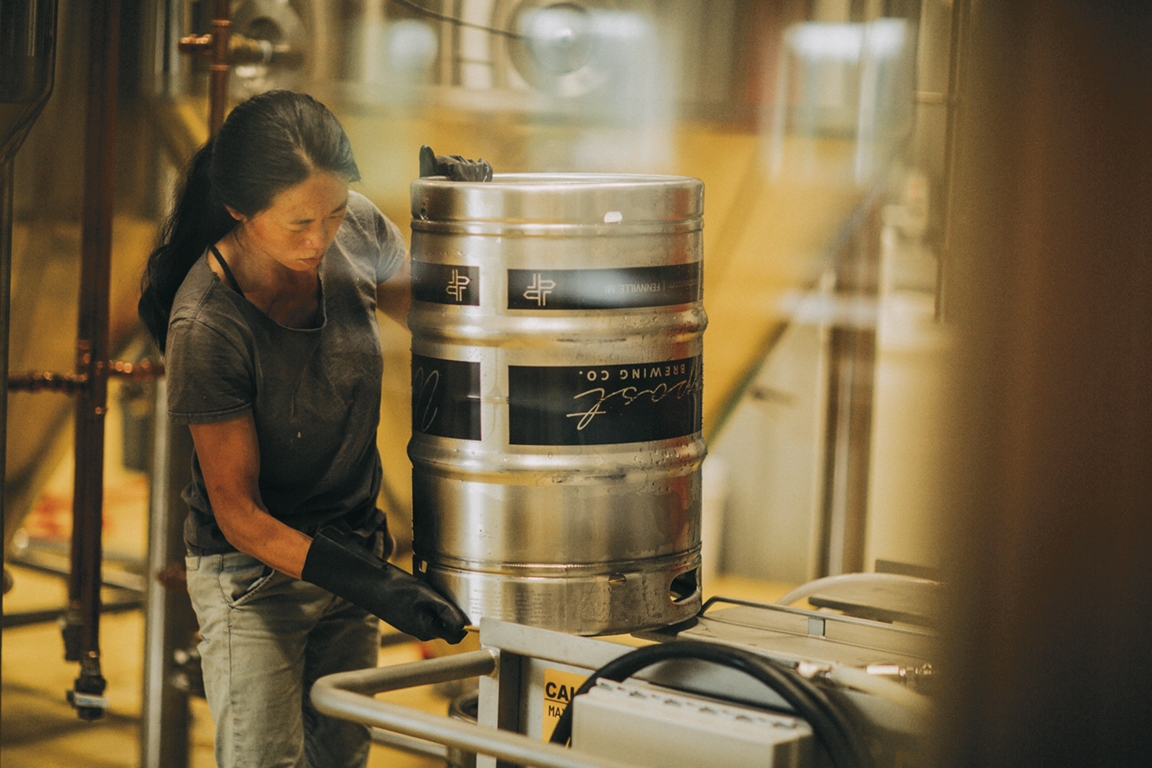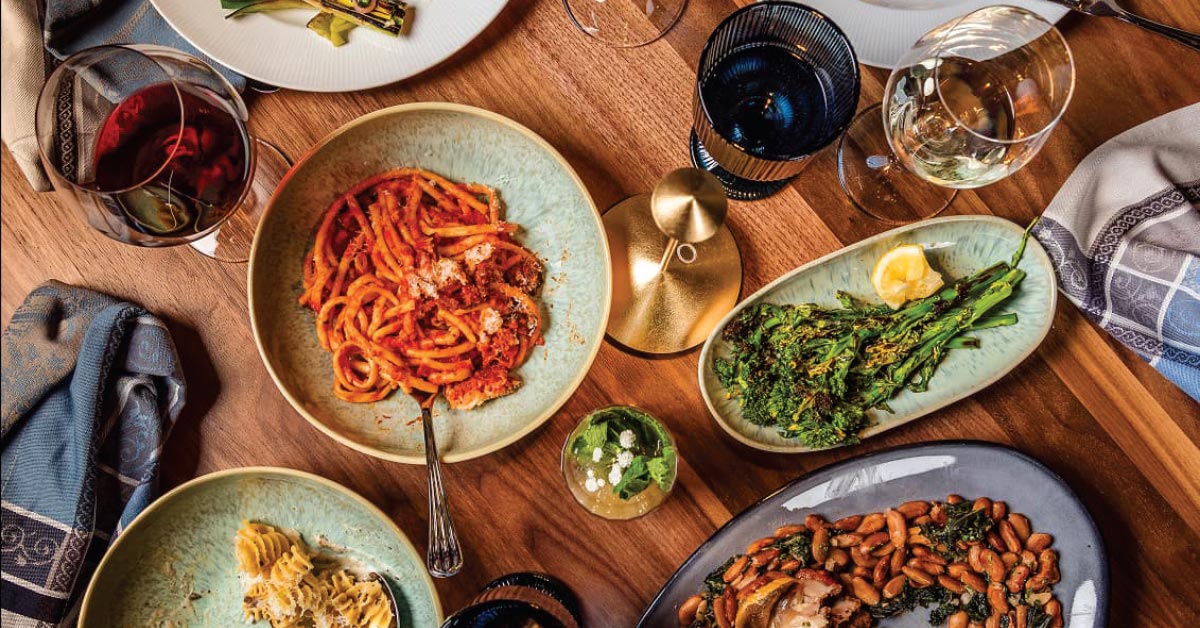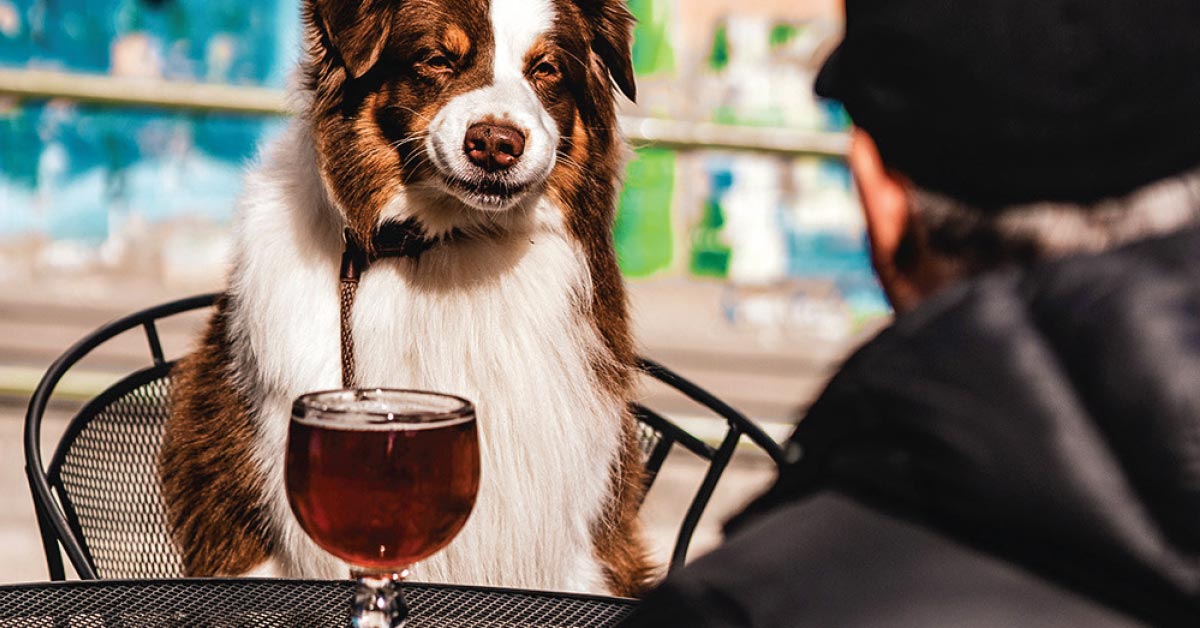In the city, it’s easy to lose touch with the natural world. Billowing smokestacks emit fake clouds. Everything is brick and asphalt we can’t eat. Then there’s the smell of a gutter.
Famed naturalist Henry David Thoreau spent his life wondering why we deny our call to the wild and subject ourselves to these concrete hellholes. I love cities, I live in one, but now and again I do get the itch to escape.
Forty minutes outside Grand Rapids, I took a sharp left off I-96 onto Blue Star Highway and saw a sign: Waypost Brewing Co. ahead. The driveway, pocked by a thousand craters, forced a slow cruise in; a chance to enjoy the surroundings. The Waypost barn is cute and red. It would make a great sorority coop for greek-life hens. But this building was destined for more than poultry. Owners Hannah Lee and Chuck Steinhardt are inside and I’m eager to learn more about their beer.
After opening last September, the pair are quickly making good on their mission to produce product that reflects where they brew. When searching for a location, they recognized Fennville for its long–standing relationship with fruit. Lo and behold, their acreage bears blueberries, blackberries and strawberries that show up in their beer. This farm-to-glass mentality extends deeper to the water beneath them.
“To be a real ‘estate’ brewery, you need to use what you have,” Lee said. “You never think about it, but water makes such a big difference. We could strip it and build it to a specific profile, but I like that you’re going to taste a difference with the changing seasons.”
It’s refreshing to hear a farmhouse brewer relinquish this type of control to nature, especially in an age where many dilute the meaning behind “farmhouse brewer” by using the term loosely as “free-range” or “fair-trade.” Scratch Brewing Company in Illinois gained notoriety for publishing a missive on how true farmhouse breweries should operate to avoid “undoing the work of small brewers who have invested significant time, money, and infrastructure into growing their own or supporting their local farms.” The tenets include growing, using and protecting plants on the property. Waypost obviously takes great care to honor the moniker.
This respect for their land likely comes from their shared experience in the wine world — vintners depend entirely on the health of their crop — but their expertise informs the brewing operation in less conspicuous ways. The taproom’s aesthetic, for instance, evokes the class of a winery’s tasting room. More overtly, Lee’s VIPA uses Gewürztraminer grapes from the vineyard Steinhardt used to work for. Yes, the wine influence was inevitable, but Lee has grown to appreciate beer’s categorical fluidity.
“If you want to produce a Bordeaux blend, there’s a very specific way it needs to be,” Lee said. “Beer has that to an extent, but American brewers are always messing with boundaries. Let’s have a Northeast IPA Lager. Can we do that?”
“Sure, just put a label on it,” Steinhardt said.
Barring the conceptual play, Lee instinctually gravitates toward uncomplicated styles.
“I like to make beers that are straightforward. Simple can be good. Simple can be elegant,” Lee said. “I don’t want to make a beer that people can’t enjoy because it’s too pretentious. It’s just beer.”
Nowhere is this ideology clearer than in the House Lager, whose flavors are calm as a meditative pause. It’s nuanced enough to think about, subtle enough to disappear into completely — the perfect post-shift drink.
Lee has a soft spot for another old-world style: Saison. “It’s hard to find a good classic one that hasn’t been dry-hopped or fruited.” Lee’s is yeast-forward, dry — but not to the bone — delicate, with hints of tangerine. Steinhardt calls his wife’s recipe the gold standard. I’m inclined to agree.
While they initially questioned whether their riskier experiments would fall flat on blue-collar palates, Steinhardt soon realized, “you can’t predict human behavior.” For example, their lactose sour with vanilla bean and homegrown blueberries sounds like a secret handshake with beer geeks. “Farmers come in dripping with mud, ripped flannels saying, hey, give me a blueberry.” Surprises come in all sizes.
At this point, what shouldn’t come as a surprise is that in an industry inundated by bearded men, Lee is definitively not one. When customers first meet Lee and Steinhardt, they often confuse just who is doing the brewing. While these microaggressions are frustrating, Lee wrestles with how to properly respond to craft beer’s boy’s club.
“Should we as women segregate ourselves on the production side or not? I don’t want to use my gender as a marketing tool,” Lee said. “I kind of like being invisible. I think your beer should stand up for itself. Not because a chick made it.”
While the issue of representation in craft beer remains an important conversation worth having, Lee leads by example.
Wayposts are typically considered pit stops on one’s larger journey. For Waypost Brewing Co., this isn’t the case. While it may be off the beaten path, plug it into your GPS and make this brewery your final destination.





